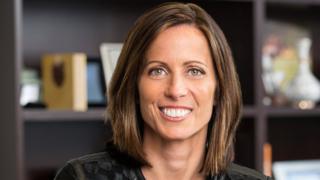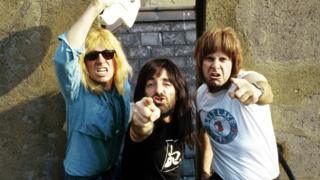 Image copyright
Image copyright
Nasdaq
Adena Friedman has been the boss of the Nasdaq for more than two years
The BBC’s weekly The Boss series profiles different business leaders from around the world. This week we speak to Adena Friedman, the chief executive of US stock market giant Nasdaq.
Adena Friedman says that being a black belt in taekwondo has helped her become more fearless in business.
The 49-year-old boss of the Nasdaq took up the martial art more than a decade ago, after taking her two sons to classes from a young age.
“It is a great discipline for my body and mind,” she says. “It has impressed upon me the idea that success is in my control.
“It has also helped reduce the fear of getting [metaphorically] punched. I know that I can get hit, and it’s not the worst thing in the world.
“I just need to decide to get back up, and keep fighting.”
Image copyright
Getty Images
Nasdaq is based in midtown New York
Ms Friedman, who has been the chief executive of Nasdaq since January 2017, is one of the world’s leading female business leaders.
In fact, Forbes magazine rates her as the 16th “most powerful” woman on the planet. This puts her ahead of talk show host turned media boss Oprah Winfrey, Queen Elizabeth II, and Jacinda Arden, the Prime Minister of New Zealand.
What makes Ms Friedman’s success at Nasdaq particularly impressive is that she started out at the company on the lowest rung of the ladder. She first joined the business back in 1993 as a 24-year-old unpaid intern.
Over the next 26 years she rose slowly but steadily to the top, spending all but three years of that time at the firm.
While Ms Friedman says she “would like to be known as a great leader, not a great female leader”, she has introduced policies to help more women get senior roles at Nasdaq.
Born and raised in the US city of Baltimore, Ms Friedman says she got inspiration to succeed in life from her parents.
It was her father who introduced her to the world of finance, as he had a senior job at an investment firm. As a child she would often spend time with him on the trading floor.
“I got to hang out with the trading guys, which was a fun place to be,” she said in a 2017 interview with Bloomberg.
Image copyright
Getty Images
She first joined Nasdaq back in 1993
Meanwhile, Ms Friedman calls her mother her “hero”. Her mum was originally a stay-at-home parent, but she went on to get a law degree and become the first female partner at a local law firm.
Educated at an all girls private school, Ms Friedman didn’t initially want to go into the world of finance. Instead, after watching Sally Ride became the first American woman to go into space in 1983, she too had dreams of becoming an astronaut.
Later, after gaining a degree in political science at Williams College in Massachusetts, she wanted to throw her hat into the political arena.
But following a stint working for former US Vice President Al Gore back when he was a US Senator, she settled instead on the world of business, where she felt she could have “more immediate impact”.
After gaining a master of business administration qualification she joined Nasdaq. She says she rose through the ranks by working hard, and happily taking on unfashionable projects, where she could show that she was able to make a big, positive difference.
By 2011 she had held a number of senior positions at the company when she had a hiatus, and was made chief finance officer and manager director, for The Carlyle Group, one of the world’s largest private investment companies.
Ms Friedman then returned to the Nasdaq in 2014, before taking up the top job in 2017. Her annual salary that year was reported to total $14m.
Image copyright
Getty Images
Ms Friedman regularly appears on US news shows
Today the company’s eponymous New York-based stock exchange is the second largest in the world by the combined value of all the company shares that are listed on it. Only its across town rival, the main New York Stock Exchange is bigger.
Nasdaq also owns seven European exchanges, including Copenhagen, Stockholm and Helsinki, and sells its software and other trading technologies to 110 other exchanges and 150 investment firms.
Last year, Nasdaq’s revenues totalled $2.53bn (£1.95bn), with a net profit of $458m.
More The Boss features:
April Rudin, a marketing strategist who specialises in the financial services sector, says that Ms Friedman is a “technology visionary” who is helping Nasdaq embrace new technological opportunities.
“She is leading not only the company, but the financial industry, through the next technology shift – cloud, block chain [the technology that underpins crypto currency], and artificial intelligence,” says Ms Rudin.
Ms Friedman herself says that while technology is important, humans will remain indispensable. Or rather, algorithms and indexes will always start with a “fundamental choice” by a human being.
Looking back on her career so far, she says it has been a “remarkable journey”.
“I hope that my career path encourages women in the workforce to realise that there is a track to leadership roles in every industry,” she says.
Image copyright
Getty Images
Ms Friedman says that taekwondo has helped her greatly
Since taking up the top job at Nasdaq, Ms Friedman’s policies to see more women secure senior roles at the business include pledging that at least 30% of the company’s board will be women – and committing to interview at least one qualified female candidate for every senior vacancy.
But whether someone looking to get on in business is male or female, she says they should “always be curious”.
“Create an environment where you and your team feel comfortable not having all the answers, but rather, enjoy asking questions to learn constantly,” she says.
“[And] never be complacent. Great companies have learned that complacency kills innovation, so they constantly need to strive and deliver the best new ideas for their clients.”
Taking up a martial art, may also help. Ms Friedman, who always makes time for taekwondo, says it reminds her “that if I want to get better, it is completely up to me to take the initiative to work harder”.












